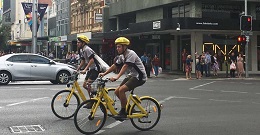07 September 2018
 If Adelaide is to realise its goal of becoming the world’s first carbon neutral city, residents and visitors need to cut down on their car use and embrace public transport, walking and cycling.
If Adelaide is to realise its goal of becoming the world’s first carbon neutral city, residents and visitors need to cut down on their car use and embrace public transport, walking and cycling.
That’s the message from two UniSA urban planners, Professor Ali Soltani and Dr Andrew Allan, who are researching the transport habits of Adelaide’s CBD residents and commuters.
A recently published report by the two academics show some major obstacles towards achieving the carbon neutral goal – most notably the proliferation of CBD car parking spaces, which are also relatively cheap compared to other capital cities, and the lack of safe cycling routes.
Professor Soltani and Dr Allan say Adelaide’s status as the most car-centric capital city in Australia is a major hurdle to cutting down on carbon dioxide emissions in the city.
The reluctance of people to embrace bike sharing schemes is another factor, reflected in the withdrawal from Adelaide this year of Chinese bike company Ofo and Singaporean operator O’Bike.
Both companies were beset by financial difficulties based partly on their operational models, but demand for the bike sharing schemes was low in Adelaide and there were also problems with the bikes being vandalised and discarded at different sites.
Statistics show that transport preferences for Adelaide commuters have barely shifted in the past 40 years, with less than three per cent of commuters cycling to work, compared to more than 80 per cent opting to drive.
Commuting to work by public transport is less popular now than in 1976, while car usage has risen over the same period.
Professor Soltani says Adelaide’s reluctance to embrace public transport, shared bike schemes and even Uber makes Adelaide City Council’s goal of a carbon-neutral city an uphill battle.
“We need more consistent policies when it comes to transport because on the one hand we are improving public transport, but we are also making life easy for private car users with cheap and plentiful parking in the CBD,” he says.
The UniSA researchers also found that while Adelaide’s CBD is a suitable area for bikes due to its layout and demography, cyclists don’t feel safe sharing the same space with motorists.
Almost 56 per cent of cyclists surveyed said they feared riding alongside large vehicles and buses and 50 per cent were worried about the risk of accidents while crossing intersections.
Cyclists have welcomed the newly-rebuilt sections of Frome Street bikeway, but a complete north-south separated bikeway is still a long way off, authorities say.
“Until cyclists’ concerns are addressed, with more stand-alone bike lanes in the CBD, and perhaps a reduction in the inner-city speed limits, we won’t make much headway,” says Dr Allan.
This may change with Bike SA announcing it is buying Ofo’s fleet of 450 leftover cycles and exploring a range of hybrid docking models. The organisation is looking to partner with Adelaide City Council and the State Government to help retrofit the bikes with locking and geo-fencing technology, providing a more flexible option for commuters. Subscription options for children and disadvantaged people are also being explored, says Bike SA chief executive Christian Haag.
Notes to media
The report, “Sharing Economy Mobility Services”, is authored by Dr Andrew Allan and Professor Ali Soltani from the University of South Australia and was funded by the CRC for Low Carbon Living. For a copy of the report, please email ali.soltani@unisa.edu.au or candy.gibson@unisa.edu.au.
Key statistics from report
- 47 per cent of residents living in Adelaide’s CBD drive or get a lift to work, while 33 per cent walk, 10 per cent take a bus and 4.6 per cent cycle;
- 65.9 per cent of Adelaide CBD residents own at least one car;
- Public transport is only preferred by people living within 500 metres of their workplace, otherwise a car is the favoured option;
- There are around 22,000 commercial car parks in Adelaide’s CBD and more than 12,000 on-street parking bays;
- A survey of just over 400 inner city Adelaide residents showed that 62.3 per cent have never used a free or share bike, 41.2 per cent have never used an Uber service and 64.5 per cent have never used any car share services. Almost a third of people surveyed, however, said they would be interested in exploring all three options.
Media contact: Candy Gibson mobile 0434 605 142 email mailto:candy.gibson@unisa.edu.au;
Dr Andrew Allan mobile 0421 061 352 email andrew.allan@unisa.edu.au;
Prof Ali Soltani mobile 0451 439 065 email ali.soltani@unisa.edu.au




